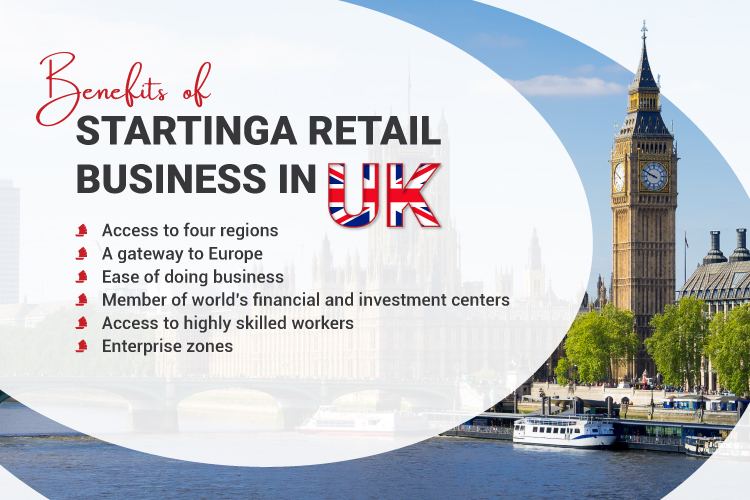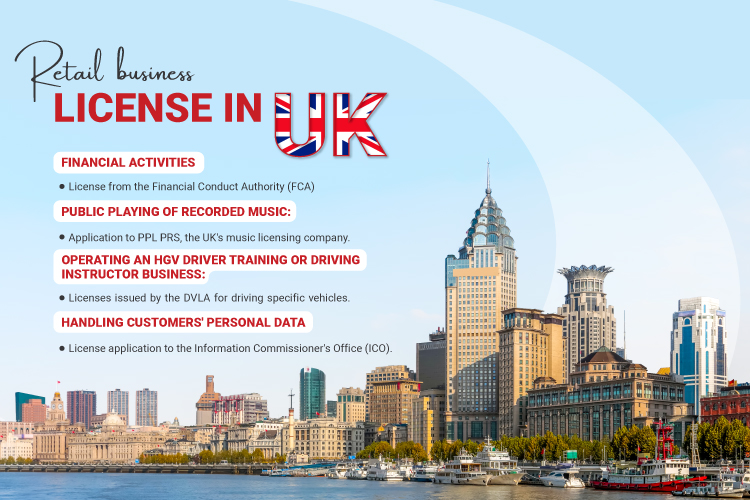- Notifications

We will only notify the newest and revelant news to you.
The retail sector in the United Kingdom presents a vibrant landscape for entrepreneurs looking to embark on a business journey. From bustling city centers to online marketplaces, opportunities abound for those ready to venture into retail. Whether you're considering opening a boutique, a specialty shop, or an e-commerce platform, understanding the essentials of starting a retail business in the UK is crucial. Below is a comprehensive guide mentioned how to open up a retail business in UK
Starting a retail business in the UK offers numerous advantages that can contribute to the success and growth of your enterprise. Below are potential benefits of starting a retail business in UK, including:

Benefits of starting a retail business in UK
The United Kingdom provides access to four diverse regions, each offering unique opportunities for business growth. With nearly 5.6 million private sector businesses across the country, including England, Wales, Scotland, and Northern Ireland, there is ample room for expansion. Whether it's setting up operations in the bustling hub of London or exploring the entrepreneurial landscape of Edinburgh, each region has its own distinct culture and advantages, catering to various industries and business needs.
For foreign companies, particularly those in Asia and North America, the United Kingdom serves as an ideal gateway to Europe. With its strategic location and robust transportation infrastructure, including connections to major European countries via rail, sea, and air, the UK offers convenient access to the European market. Despite Brexit, the UK-EU Trade and Cooperation Agreement ensures continued access to European markets for UK businesses, making it an attractive destination for companies looking to tap into the vast European consumer base.
The UK ranks among the top countries globally for ease of doing business, offering a favorable environment for startups and foreign investors alike. With streamlined processes for company registration, minimal bureaucratic hurdles, and strong legal protections, the UK provides a conducive ecosystem for business growth. Additionally, its central time zone facilitates seamless communication with international partners across different regions, enhancing efficiency and productivity.
London stands as a global financial powerhouse, home to prestigious institutions such as the Bank of England and the London Stock Exchange. Renowned for its business-friendly environment, skilled workforce, and robust infrastructure, London attracts billions in investment, particularly in the fintech sector. As one of the leading financial centers worldwide, the UK offers unparalleled opportunities for companies seeking to access capital markets and expand their financial footprint.
Operating in the UK provides access to a diverse and highly skilled workforce, with millions of talented professionals spanning various industries. The UK's flexible labor laws and meritocratic immigration system make it easier for companies to attract top talent from both EU and non-EU countries, ensuring a steady supply of skilled workers to support business growth and innovation.
The UK government has established enterprise zones (EZs) to incentivize business expansion and investment, offering tax breaks, government support, and simplified planning processes. These designated areas provide an attractive environment for new and expanding companies, with incentives such as business rate discounts and tax relief on investments in manufacturing. By locating your business in an EZ, you can benefit from a supportive ecosystem that fosters growth and innovation.
To legally operate a retail business in the UK, you must obtain the necessary licenses and permits. The requirements can vary based on the location and type of products you sell. It's important to contact your local council to find out the specific licensing requirements for your retail business.
A business license grants permission for specific types of business operations, typically issued by the local authority or specialized government bodies.
While many businesses do not require licenses, certain activities necessitate one, such as operating a taxi company, food establishment, hotel, childcare facility, hair salon, tattoo studio, gambling service, security firm, or pet store.
Here are additional examples of retail business license in UK:

Retail business license in UK
Regarding online sales in the UK, no special license is necessary. However, compliance with relevant regulations is essential, including VAT, exporting rules, and distance selling regulations, especially for international sales.
Retail encompasses a broad spectrum of business types and models, including various types of retail stores. Below are 7 main type of retail business in UK:
A retail business plan is a written blueprint detailing the objectives of a new business venture. It typically encompasses the business's principles, concept, historical context, and financial data. Below are key components typically found in such a plan:
The cost of starting a retail business in the UK can vary widely depending on a range of factors, including the type of retail business, location, and scale of operations. Basic expenses include:
It's important to budget carefully and consider potential financial challenges that might arise during the initial phases of your business.
To conclude, starting a retail business in the UK is an exciting venture with great potential for success. By understanding the types of retail businesses available, the necessary licensing requirements, the critical components of a strong business plan, and the costs involved, you can set a solid foundation for your new enterprise. With thorough preparation and strategic planning, your retail business can flourish in the competitive UK market.
Latest news & insights from around the world brought to you by One IBC's experts
We are always proud of being an experienced Financial and Corporate Services provider in the international market. We provide the best and most competitive value to you as valued customers to transform your goals into a solution with a clear action plan. Our Solution, Your Success.